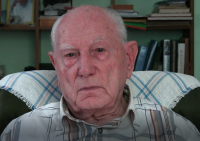We had our repatriates´ IDs, but we were no repatriates!

Download image
Stefan Lesków was born on 23rd Mai 1933 in Lviv/Lwów, which was at the time part of Poland, into a Polish family of Emilie and Michal Leśków. He grew up in the wrokers´ district of Malé Krzywczyce, where his father worked in a factory. Later his family moved into a small house on one of the main raods of the city – Łyczakowska. There he witnessed the arrival of the Red Army after the Soviet invasion in September 1939. The Soviet occupation had a detrimental impact on the family. Mother Emilia was arrested by the NKVD and accused of being a profiteer, because she bought more goods than allowed. She was put in jail for six months. After Germany invaded the USSR in 1941, the Soviets deported their prisoners to Siberia and the family lost contact with their mother for a long time. During the German occupation Stefan witnessed transports of Jews into working camps and also saw the guards shooting down those that tried to escape. After the war, the family had to leave Lviv/Lwów, because the Eastern frontier of the USSR shifted further West. They settled in Wroclaw (Breslau in German), previously German territory gained by Poland after the war.
